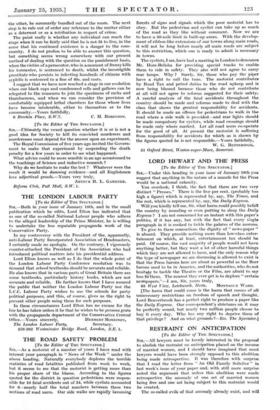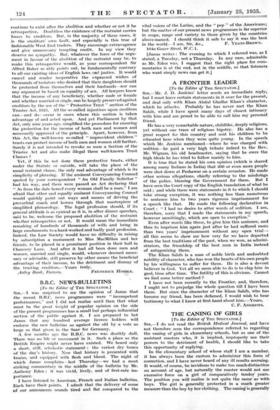RESTRAINT ON ANTICIPATION
[To the Editor of TILE SPECTATOR.] lawyers must be keenly interested in the proposal to abolish the restraint on anticipation placed on the income of married women, and I should have imagined that most lawyers would have been strongly opposed to this abolition being made retrospective. It was therefore with surprise that I read the letter from " An Old Family Solicitor " in last week's issue of your paper and, with still more surprise noted the argument that unless this abolition were made retrospective the anomaly of one set of married women being free and one set being subject to this restraint would be created.
The so-called evils of that anomaly already exist, and will continue to exist after the abolition and whether or not it be retrospective. Doubtless the existence of-the restraint carries losses to creditors. But, in the majority of these cases, it is the creditors' own fault, and especially is this true of fashionable West End traders. They encourage extravagance and give unnecessary tempting credit. In my view they deserve no sympathy. But, whatever the force of the argu- ment in favour of the abolition of the restraint may be, to make this retrospective would, as your correspondent Sir Alfred Baker so ably points out, be fundamentally contrary to all our existing ideas of English laws and justice. It would cancel and render inoperative the expressed wishes of thousands of testators who desired that their daughters should be protected from themselves and their husbands—nor can any argument be based on equality of sex. All lawyers know that the income of any beneficiary, whether male or female and whether married or single, can be largely preserved against creditors by the use of the " Protective Trust " section of the Trustee Act, 1925. All the so-called injustices upon creditors can—and do—occur in cases where this section is taken advantage of and acted upon. And yet Parliament by that Act, only nine years ago, simplified the procedure for ensuring the protection for the income of both men and women and necessarily approved of the principle. Apart, however, from this Act, the well-known so-called " improvident children " trusts can protect income of both men and women still further. Surely it is not intended to revoke so soon a Section of the Trustee Act and also make illegal these well-known Trust Clauses ?
Yet, if this be not done these protective trusts, either under the Statute or outside, will take the place of the usual restraint clause, the only real advantage of which is its simplicity of phrasing. If the eminent Conveyancing Counsel quoted by your correspondent " An Old Family Solicitor " had his way, and there were passed an Act declaring that " As from the date hereof every woman shall be a man," I am afraid that other and equally eminent Conveyancing Counsel would quickly point out ways and means of driving the proverbial coach and horses through that masterpiece of simplified phraseology. The legal profession should, if its general attitude is as cynical as it is, in after dinner speeches, said to be, welcome the proposed abolition of the restraint whether retrospective or not. It would mean the immediate remaking of hundreds of thousands of wills and bring in large emoluments to a hard-worked and badly paid profession. Indeed, the Law Society would have no difficulty in raising by subscription a monument to Miss MacMillan and her friends, to be placed in a prominent position in their hall in Chancery Lane. And after it had all been done men and women, married and single, would, whenever deemed neces- sary or advisable, still preserve by other means the beneficial advantage of their income, to the detriment and dismay of the trusting creditors.—Yours truly,















































 Previous page
Previous page